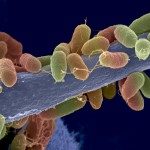Link to Pubmed [PMID] – 17273823
Curr. Genet. 2007 Apr;51(4):277-84
We recently developed a silencing vector in Aspergillus fumigatus which carries a hygromycin resistance marker and a transcriptional unit for hairpin RNA expression under the control of the inducible glucoamylase promoter (pGla) (Mouyna et al. in FEMS Microbiol Lett 237:317-324, 2004). We showed previously that this vector can be used for the RNA interference application of two genes ALB1 and FKS1 of which reduced mRNA levels occurred for both, with phenotypic consequences resembling disruptions of genes involved in melanin (ALB1) and beta(1-3)glucan biosynthesis (FKS1). We reported here the silencing of KRE6 and CRH1, two other genes putatively involved in cell wall biosynthesis using a similar construction under the control of the constitutive promoter glyceraldehyde-3-phosphate dehydrogenase (pgpdA). Silencing of the expression of these two genes was obtained. Further analysis of the transformants showed however that (1) a 100% loss of expression was never achieved for all genes tested (2) the vector used for RNAi is lost or modified over successive transfers resulting in an inhibition of the silencing. These disadvantages of RNAi indicate that classical gene disruption by gene replacement remains the most efficient method for a molecular analysis of gene function in A. fumigatus.



